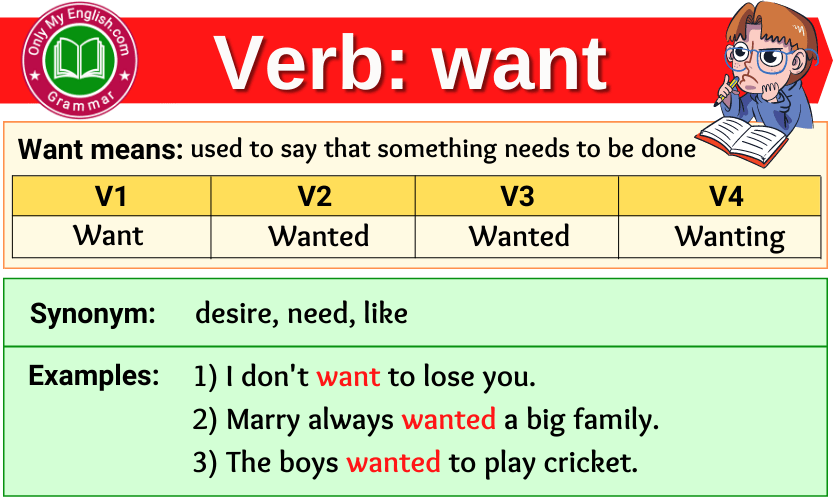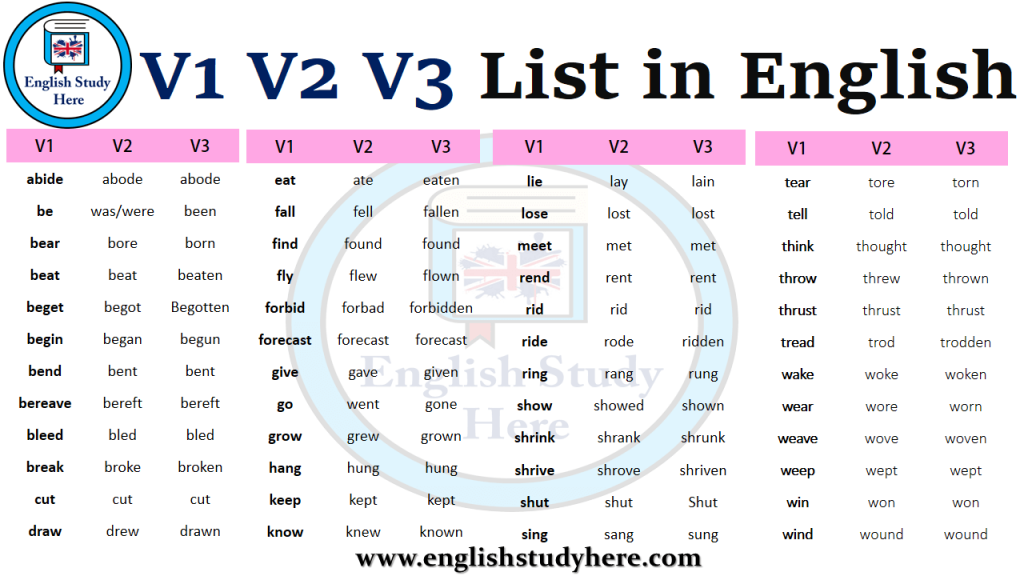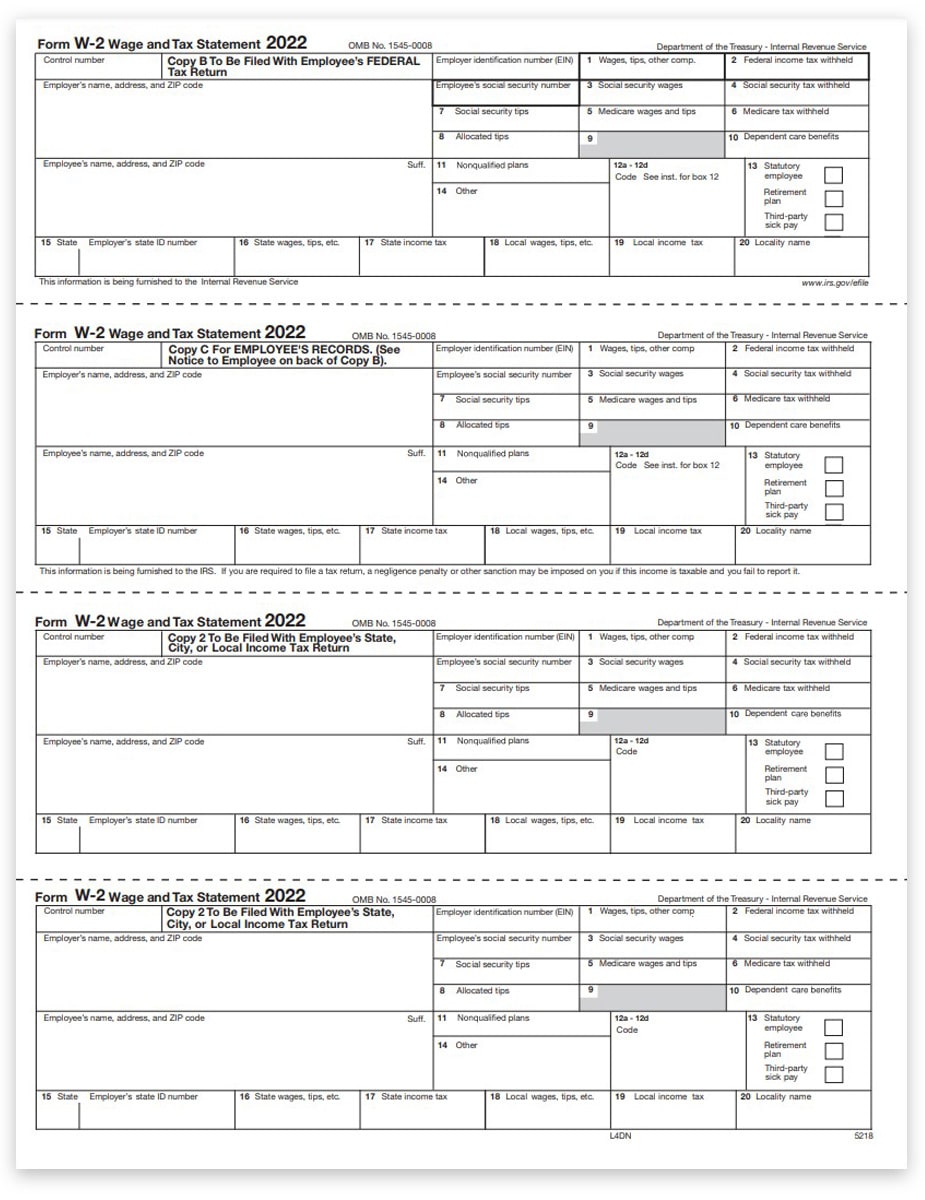
i want verb forms v1 v2 v3 v4 v5 and 50 verbs i want please give me the answer Brainly.in
Learn the three forms of the English verb 'want' the first form (V1) is 'want' used in present simple and future simple tenses. the second form (V2) is 'wanted' used in past simple tense. the third form (V3) is 'wanted' used in present perfect and past perfect tenses. What are the past tense and past participle of want?

Want Verb Forms Past Tense, Past Participle & V1V2V3 »
Want Verb Forms (V1, V2, V3, V4, V5): In present tense conjugations, we typically use the verb "to+V1". Here are some conjugations of "to+V1" in the present tense: In present tense conjugations, we typically use the verb "have+V3". Here are some conjugations of "have+V3" in the present tense:

English Grammar Notes, Teaching English Grammar, English Verbs, English Language Learning
Here are Detailed Verb Forms v1 v2 v3 with PDF Example Sentences with WANT Advertisements Yesterday there was a Samara asking about Tim. The body wanted his phone number. She really envies me because I can get shopping as much as her want. I do not want this. She always wanted to do things her way. Advertisements About The Author admin

Know Past Simple, Simple Past Tense of Know, V1 V2 V3 Form Of Know Know means move from one
Want Past and Past Participle Form, v1 v2 v3 v4 v5 form of Want Meaning of Want Have a desire to possess or do (something); wish for.(verb) Example Sentences with Want I want an apple. Victorian houses which are in want of repair. Verb Want Past Tense(V2) Wanted Past Participle(V3) Wanted es (V4) Wants ing (V5) Wanting

150 V1 Base Form, V2 Simple Past, V3 Past Participle Verb List In English there are regular
For proper utilize of English, We need to know the proper uses of Words & their Verb form. Verb can transform from various way in real life. So Students, here in this post, We will discuss various form of verb and also the Synonyms and Antonyms for 'Want '. Want V1 V2 V3 V4 V5 Past and Past Participle Form

V1 V2 V3 List English Study Here
Want Past Simple, Past Participle, V1 V2 V3 Form of Want Verb; Want Meaning; request, ask, ask for, require, wish V1, V2, V3, V4, V5 Form of Want Base Form Past Form Past Participle want wanted wanted Base Form s/es/ies ing Form want wants wanting Synonym for Want request ask ask for require wish desire lust after long for have a yen for aspire sue claim postulate requisition long wish for.

W2 Tax Forms for Employees, 4up V2 Copy B, C, 2, 2
I will/shall have wanted. You/We/They will/shall have wanted. Future Perfect Continuous Tense. He/She/It will/shall have been wanting. I will/shall have been wanting. You/We/They will/shall have been wanting. This is a reference page for want verb forms in present, past and participle tenses. Find conjugation of want.

V1 V2 V3 Verb forms List (PDF download) 300+ Words
Verb; Want Meaning; request, ask, ask for, require, wish V1, V2, V3, V4, V5 Form of Want Synonym for Want request ask ask for require wish desire lust after long for have a yen for aspire sue claim postulate requisition long wish for hope

Verb 2 Want
Lack or be short of something desirable or essential. (verb) Synonyms desire, wish for, hope for, fancy, have a fancy for, take a fancy to, have an inclination for, care for, like, set one's heart on, should, ought, need, must, lack, absence, non-existence, unavailability, wish, desire, demand, longing, yearning, fancy, craving, hankering,

a poster with the words in english and an image of what to choose for each subject
Past Tense of Want, Past Participle of Want, V1 V2 V3 V4 V5 Form of Want Want means; Have a desire to possess or do (something); wish for. Verb V2 V3 V-es V-ing want wanted wanted wants wanting Synonym Words With Want desire wish for hope for fancy have a fancy for take a fancy to care for like should ought need must lack absence non-existence Example Sentences with Want Despite being ill, he.

Verbs form part 2 of 1000 verbs form list. V1, V2,V3, V4, V5 in English. YouTube
Conjugation verb want X English Conjugate Toolbox: Models British vs. American English Auxiliaries, modals Irregular verbs want Infinitive to want Preterite wanted Past participle wanted Model : obey Auxiliary : have, be Other forms: want oneself / not want Contractions Advertising Indicative Present I want you want he/she/it wants we want you want

Pin on V1 V2 V3 Form of Verbs
Meaning: feel the need or desire for (someone or something Table of Contents Want Verb Forms V1 V2 V3 V4 V5 Want Past Tense: Past Tense of Want is Wanted. Example: Sarah wanted the cake. Want Past Participle: Past Participle Form of Want is Wanted. Example: Sarah has wanted the cake. Want Present Participle:

Want Past Tense, V1 V2 V3 V4 V5 Form Of Want, Past Participle Of Want and Example Sentences
Want Past Tense, V1 V2 V3 V4 V5 Form Of Want, Past Participle Of Want and Example Sentenceshttps://englishgrammarhere.com/verbs/want-past-tense-v1-v2-v3-form.

Pin on V1 V2 V3 Form of Verbs
Want verb forms Present Past Future simple perfect continuous Tenses learn spoken English course online through Telugu spoken English classes.. Base form (v1) Want: Past form (v2) Wanted: Past Participle (v3)-ed form: Wanted: Present Participle (v4) 'ing' form: Wanting: Present simple (v5) s / es/ ies : Wants: Want present tense Simple.

the english spelling list for v1 and v3
from English Grammar Today We use the verb want to talk about wishes and needs, and to give advice: What do you want for dinner tonight? (wish or desire) The kitchen wants painting. (needs) You want to get your tickets soon before they're all sold out. (I advise you to) Most uses of want involve the simple forms of the verb ( want, wants, wanted ).

V1 V2 V3 Examples English Study Here
At school, students often learn by heart the base, past simple and past participle (sometimes called V1, V2, V3, meaning Verb 1, Verb 2, Verb 3) for irregular verbs. They may spend many hours chanting: sing, sang, sung; go, went, gone; have, had, had; etc. They do not learn these for regular verbs for one very simple reason - the past simple and past participle are always the same: they are.